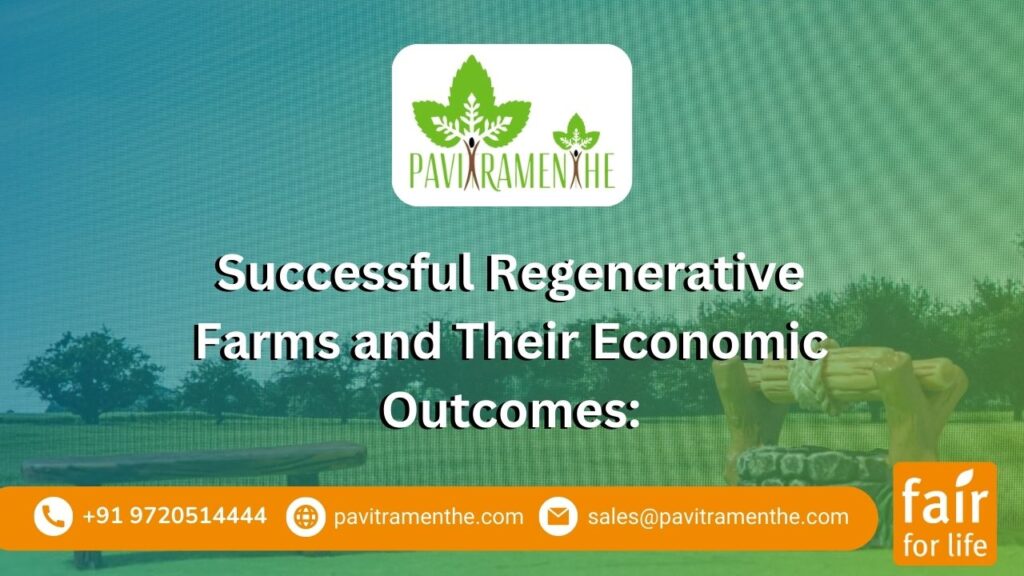Regenerative agriculture has gained significant attention in recent years as a sustainable farming practice that aims to restore soil health, promote biodiversity, and mitigate climate change. In addition to its environmental benefits, it farming has also shown promising economic outcomes for farmers. This blog explores some inspiring case studies of successful regenerative farms and the positive economic impacts they have experienced. Let’s delve into these stories and learn from their achievements.
Green Meadows Farm
A Model for Profitability: and Soil Restoration Located in the heartland of the United States, Green Meadows Farm is a prime example of how regenerative practices can result in both environmental restoration and economic prosperity. The farm’s transition from conventional farming to it practices has been instrumental in improving soil health, reducing input costs, and increasing yields. By implementing techniques such as cover cropping, rotational grazing, and minimal tillage, Green Meadows Farm has witnessed a significant reduction in the need for synthetic fertilizers and pesticides. This, in turn, has translated into substantial cost savings and increased profitability. The farm has also diversified its income streams by selling premium organic produce and grass-fed meat, commanding higher prices in the market. The success of Green Meadows Farm demonstrates that it agriculture can be a viable and lucrative business model.
Also Read- The Future of organic herb farming
Paradise Valley Winery: From Soil Degradation to Award-Winning Wines Paradise Valley Winery, nestled in a picturesque region renowned for its vineyards, faced severe soil degradation due to decades of conventional grape farming practices. Seeking a sustainable solution, the winery adopted regenerative viticulture techniques. By implementing practices such as cover cropping, composting, and the use of beneficial insects, Paradise Valley Winery successfully restored soil health and biodiversity, leading to a remarkable improvement in grape quality and vineyard productivity. The winery’s commitment to regenerative practices has not only resulted in a positive environmental impact but has also garnered recognition for its wines in prestigious competitions and increased market demand. The higher-quality grapes, combined with a growing reputation for sustainable farming, have allowed Paradise Valley Winery to command premium prices, resulting in improved economic outcomes for the winery and the local community.
Sunflower Fields Cooperative: Collaboration and Market Access The Sunflower Fields Cooperative in a rural community was faced with the challenge of limited market access and declining farm profitability. Recognizing the potential of it farming to transform their circumstances, a group of farmers formed a cooperative and adopted regenerative practices collectively. By sharing knowledge, resources, and equipment, the cooperative members were able to implement regenerative techniques more efficiently and cost-effectively. The results were impressive: improved soil health, increased yields, and enhanced biodiversity. To ensure economic success, the cooperative focused on creating market linkages and promoting their regeneratively grown products. By collaborating with local restaurants, farmers’ markets, and regional distributors committed to sustainability, the Sunflower Fields Cooperative has established a loyal customer base and captured a niche market segment. The cooperative’s success story showcases the power of collaboration, market access, and a shared commitment to regenerative agriculture.
Riverside Ranch: Diversification and Resilience Riverside Ranch faced challenges due to unpredictable weather patterns and market fluctuations in their traditional farming practices. Seeking a more resilient approach, they embraced regenerative farming techniques. By implementing practices such as agroforestry, water management, and rotational grazing, Riverside Ranch improved soil health, water retention, and pasture productivity. One significant outcome of their regenerative practices was the ability to diversify their income streams. The ranch started offering agritourism activities, such as farm tours, workshops, and farm-to-table events, attracting visitors and generating additional revenue. The regenerative approach not only enhanced the ranch’s environmental sustainability but also provided economic stability and resilience through diversified income sources


Challenges and Solutions in Implementing Regenerative Farming:
Regenerative farming: is an approach to agriculture that aims to restore and enhance the health of ecosystems, improve soil fertility, and promote sustainable farming practices. While it offers numerous benefits, implementing regenerative farming can also pose certain challenges. Here are some common challenges and potential solutions associated with implementing regenerative farming practices:
Knowledge and Education: Challenge: Many farmers may lack knowledge and awareness about regenerative farming techniques and the potential benefits they offer. Solution: Providing education and training programs on regenerative farming practices can help farmers understand the principles, techniques, and benefits involved. Collaborating with agricultural institutions, organizations, and experienced regenerative farmers can facilitate knowledge sharing and dissemination.
Transition Period: Challenge: Shifting from conventional farming methods to regenerative practices often requires a transition period, during which farmers may experience initial financial and operational challenges. Solution: Offering financial incentives, grants, and subsidies to support farmers during the transition period can alleviate the financial burden. Additionally, providing technical assistance and guidance to farmers during the transition can help them navigate the process more effectively.
Infrastructure and Equipment: Challenge: Implementing regenerative farming practices may require modifications to existing infrastructure and investments in specialized equipment. Solution: Government support and funding programs can assist farmers in upgrading their infrastructure and acquiring necessary equipment for regenerative farming. Collaborations with equipment manufacturers and technology providers can lead to the development of cost-effective and efficient tools specific to regenerative practices.
Monitoring and Assessment: Challenge: Tracking and measuring the progress and impact of regenerative farming practices can be challenging, particularly for small-scale farmers. Solution: Developing monitoring tools and methodologies, such as soil testing kits and remote sensing technologies, can help farmers assess the impact of their regenerative practices. Sharing case studies and success stories from other farmers can also demonstrate the benefits and encourage adoption.
Market Access and Consumer Demand: Challenge: Connecting regenerative farmers with markets that value and appreciate the benefits of regenerative products can be a hurdle. Solution: Developing strong marketing and branding strategies that highlight the regenerative aspects of the farm products can help attract consumers who prioritize sustainable and environmentally friendly options. Collaborating with local markets, restaurants, and community-supported agriculture (CSA) programs can create direct channels for regenerative farmers to reach conscious consumers.
Policy and Regulation: Challenge: Existing policies and regulations may not adequately support or incentivize regenerative farming practices. Solution: Engaging policymakers and advocating for supportive policies, such as tax incentives for regenerative farmers, sustainable agriculture grants, and streamlined certification processes, can create an enabling environment for regenerative farming. Farmers can also join forces with organizations and associations to collectively voice their needs and concerns.

